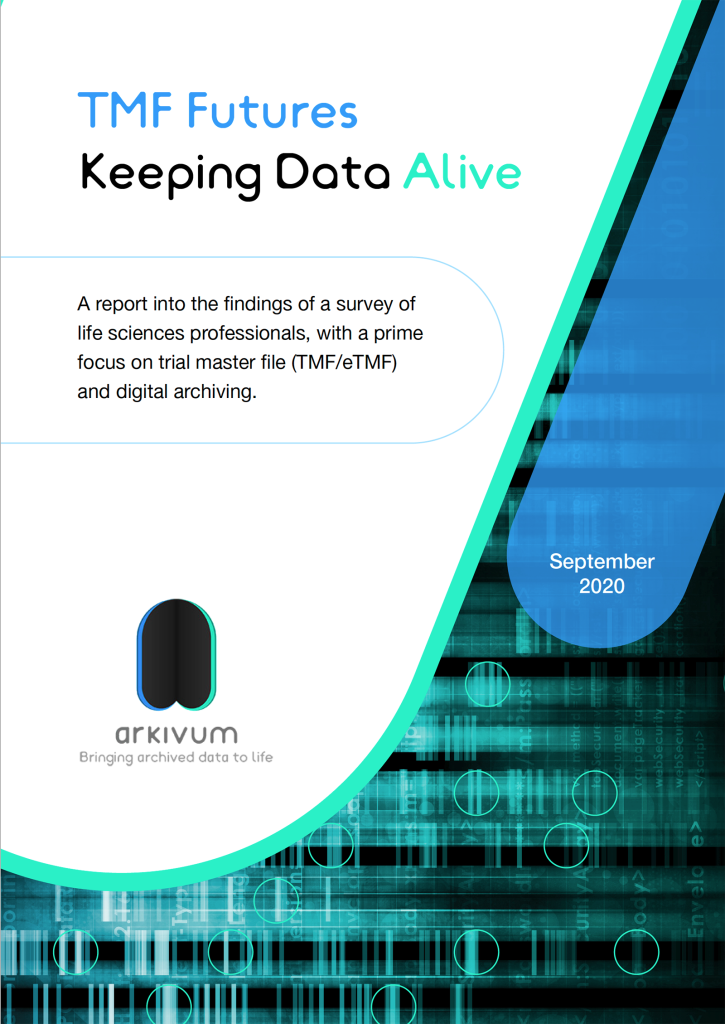Arkivum report: TMF Futures, Keeping Data Alive
 Arkivum is delighted to publish a new report into the major trends impacting the long-term management of clinical trial data for life sciences organisations. Forming the core of this unique report, TMF Futures, Keeping Data Alive, is a survey of more than 200 life sciences professionals. It was undertaken with the key aims of gaining insight into:
Arkivum is delighted to publish a new report into the major trends impacting the long-term management of clinical trial data for life sciences organisations. Forming the core of this unique report, TMF Futures, Keeping Data Alive, is a survey of more than 200 life sciences professionals. It was undertaken with the key aims of gaining insight into:
• the clinical trial data strategies adopted by global life sciences organisations,
• the associated priorities and challenges, and
• the processes required to maintain a constant state of inspection-readiness for trial master file (TMF) data while aligning the digital archive to the broader goals and objectives of today’s life sciences company.
Throughout the report, the survey findings are complemented by comment from experts who represent diverse disciplines and functions – both directly and indirectly involved with the management of TMF data and the outcomes associated with it. They discuss such topics as the potential for approaching TMF archiving in terms of digital preservation – a form of good practice that can open the way to further discoveries and new opportunities.
The full report can be downloaded for free by completing the form below.
Here are some of the key findings:
Impact of COVID-19 on clinical trials: In 2020, the COVID-19 pandemic has presented major challenges for the conduct of clinical trials, but it has also highlighted the value and potential of digital technology. Measures taken in the face of COVID-19 have presented an opportunity to accelerate technological adoption:
- Three out of four (74%) life science organisations say that COVID-19 has negatively affected their organisation’s ability to deliver on its clinical trial objectives over the next six to 12 months.
- 41% of clinical trials in therapeutic areas other than COVID-19 have been delayed or put on hold indefinitely.
- As the industry moves past the first wave of the crisis, 70% of respondents say the pandemic now presents an opportunity for changing the way clinical trials are conducted in the future.
Adoption of technology to manage clinical trials: The survey confirms that many life sciences organisations have made great strides in using technology to modernise the clinical trial process, thus increasing efficiency, enhancing collaboration and improving trial performance. In addition, optimising the management of data and documents in clinical trials: The quest to increase efficiency, enhance collaboration and improve trial performance has transformed the primarily paper trial master file (TMF) into an electronic trial master file (eTMF).
- Over 90% of sponsors and CROs have adopted an eClinical application to improve study execution and data collection.
Fragility in critical systems: Yet the survey findings also suggest fragility in certain critical systems in the clinical trial process, notably a lack of interoperability between eClinical systems. Not only can this undermine progress that has been made, it can engender regulatory risk, potentially causing delays to marketing authorisation applications (MAA) and compromising inspection-readiness of archived TMF data.
- 45% of CROs continue to struggle to manage, locate and report data, while 50% are unable to convert documents from multiple software applications in order to be able to make use of them.
- Despite the clear importance of TMF data, 38% of clinical trial sponsors currently describe their ability to access data and records from the TMF archive as ‘extremely inadequate’. This rises to 65% amongst QA, compliance, legal and regulatory professionals
The potential that lies in the archive: The survey also found that less than half of respondents are using digital archives that offer sufficient functionality to assure long-term inspection-readiness while also enhancing the trial sponsor’s ability to innovate – for instance by extending the lifecycle and commercial scope of approved medicines through new indications and formulations, or licensing and partnership opportunities. Taking action Clearly, stakeholders in clinical trials will benefit from:
- surmounting current challenges of interoperability and deficiencies in data management.
- tapping into the scientific and commercial potential that lies in digitised clinical-trial data which has been archived in accordance with the FAIR principles (Findable, Accessible, Interoperable, Reusable) .
To access the full report, simply complete the form on this page and you will receive your copy.

Tom Lynam
Tom is the Marketing Director at Arkivum. He joined the business in January 2020 tasked with driving new business growth and building the brand into new sectors such as Pharmaceutical and Life Sciences. He has over 12 years’ experience in several diverse marketing leadership roles across technology and professional services organisations.
Get in touch
Interested in finding out more? Click the link below to arrange a time with one of our experienced team members.
Book a demo